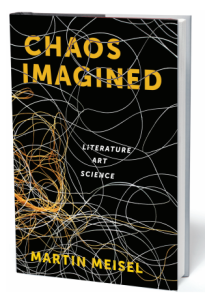Literature, Art, Science
Martin Meisel
“Martin Meisel’s magnum opus is a heroic act of defiance against its own subject matter: an enlightening, judicious, cohesive history of three millennia of thought about the terrors and attractions of chaos. The book moves with steady confidence through literature, science, art, and philosophy, illuminating many varieties of darkness, finding convincing and original connections across centuries and continents. With authority and energy, it creates a whole new field of study.”
—Edward Mendelson, Columbia University
“Meisel’s is a bravura performance, one of those rare critical studies not for one but for all seasons.”
—Marjorie Perloff, Stanford University
The stories we tell in our attempt to make sense of the world, our myths and religion, literature and philosophy, science and art, are the comforting vehicles we use to transmit ideas of order. But beneath the quest for order lies the uneasy dread of fundamental disorder. True chaos is hard to imagine and even harder to represent, especially without some recourse to the familiar coherency of order. In this book, Martin Meisel considers the long effort to conjure, depict, and rationalize extreme disorder, with all the passions, excitements, and compromises the act has provoked.
In seven chapters—“Shaping Chaos,” “Nothing and Something,” “Number,” “Carnival,” “War,” “Energy,” and “Entropy”—Meisel builds a rough history from major social, psychological, and cosmological turning points in the imagining of chaos. He uses examples from literature, philosophy, painting, graphic art, science, linguistics, music, and film, particularly exploring the remarkable shift in the eighteenth and nineteenth centuries from conceiving of chaos as disruptive to celebrating its liberating and energizing potential. Discussions of Sophocles, Plato, Lucretius, Calderon, Milton, Haydn, Blake, Faraday, Chekhov, Faulkner, Wells, and Beckett, among others, are matched with incisive readings of art by Brueghel, Rubens, Goya, Turner, Dix, Dada and the futurists. Meisel addresses the revolution in mapping energy and entropy and the manifold impact of thermodynamics. Known for his pathbreaking studies of literature, drama, and the visual arts, Meisel uses this chaotic frame to elaborate on larger concerns of purpose, mortality, meaning, and mind.
Martin Meisel is Brander Matthews Professor of Dramatic Literature Emeritus at Columbia University. He is the author of Shaw and the Nineteenth-Century Theatre and Realizations: Narrative, Pictorial, and Theatrical Arts of the Nineteenth Century.
Order online at cup.columbia.edu.
